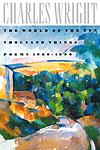Charles Wright
Charles Wright is an American poet and author known for his lyrical and meditative poetry. He has received numerous awards, including the Pulitzer Prize for Poetry and the National Book Award. His work often explores themes of nature, spirituality, and the passage of time.
Books
This list of books are ONLY the books that have been ranked on the lists that are aggregated on this site. This is not a comprehensive list of all books by this author.
-
1. The Sociological Imagination
"The Sociological Imagination" is a seminal work that challenges readers to understand the relationship between individual experiences and the wider society. The book argues that one's personal issues are often linked to broader social and historical forces. It emphasizes the importance of adopting a sociological perspective to analyze how societal structures, such as class inequality and cultural norms, influence personal choices and opportunities. By doing so, it encourages individuals to see the connection between their personal lives and the larger social context, thereby fostering a deeper understanding of both.
The 3009th Greatest Book of All Time -
2. The World Of The Ten Thousand Things
"The World of the Ten Thousand Things" is a collection of poems that delve into the themes of time, language, and the nature of existence. The poet reflects on the spiritual and the mundane, weaving together the personal with the universal. Through vivid imagery and contemplative verse, the work explores the interconnectedness of all things, drawing inspiration from the landscapes of the American South, art, and the complexities of one's inner world. The poems oscillate between the ephemeral and the eternal, inviting readers to ponder their place within the vast tapestry of life.
The 8625th Greatest Book of All Time -
3. The Wig
This book is a poignant exploration of African American life and identity through the lens of its young protagonist, Lester Jefferson. Set against the backdrop of the 1960s, the narrative delves into Lester's journey of self-discovery and the societal pressures he faces. With humor and sensitivity, the story addresses themes of poverty, racism, and the quest for personal dignity. Lester's transformation, symbolized by his acquisition of a wig, serves as a powerful metaphor for the complexities of racial identity and the desire for acceptance in a rapidly changing America. Through Lester's eyes, readers are offered a unique and insightful perspective on the struggles and resilience of the African American community during a tumultuous era.
The 9134th Greatest Book of All Time


